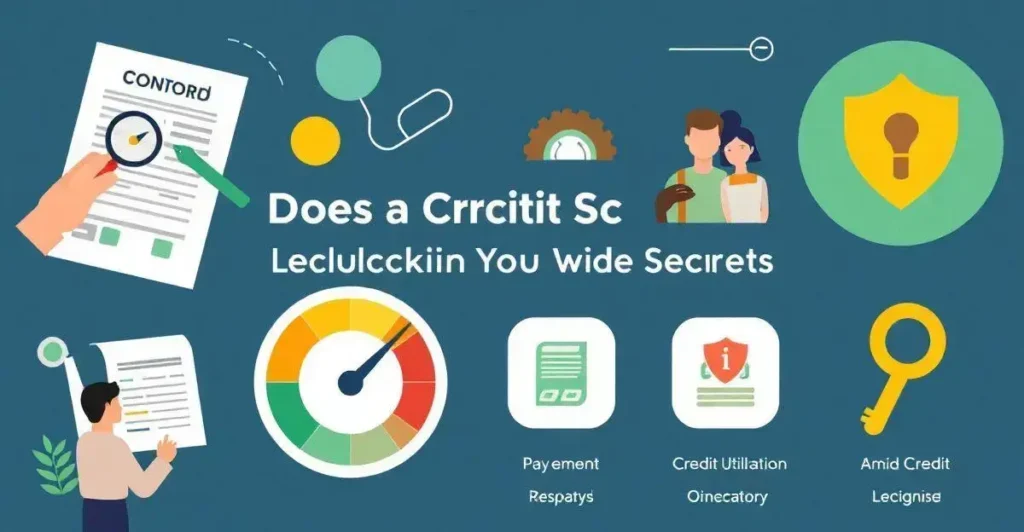Impact of credit score on loans plays a vital role in your borrowing journey. A high score increases your chances of approval and leads to better interest rates, while a low score can make loans harder to secure or more expensive.
Your credit score is influenced by factors like payment history and credit utilization. It reflects how trustworthy you are as a borrower, with a higher score signaling lower risk to lenders.
Improving your credit score can open doors to better loan terms. Want to learn how to boost your score and save money on loans? Keep reading to discover practical tips.
Understanding Credit Scores
Understanding your credit score is essential for navigating the loan process. A credit score is a number that ranges from 300 to 850. This number reflects your creditworthiness to lenders. The higher your credit score, the more likely you are to qualify for loans with better interest rates and terms.
The impact of credit score on loans is significant, as a higher score can result in more favorable loan offers.
What Influences a Credit Score?
Your credit score is affected by several key factors:
- Payment History: This accounts for about 35% of your score. Timely payments boost your score, while missed payments can hurt it significantly.
- Credit Utilization: This represents about 30% of your score. It measures how much of your available credit you are using. Keeping this number below 30% is a good practice.
- Length of Credit History: A longer credit history can positively affect your credit score, contributing about 15% to it.
- Types of Credit: Having a mix of credit types, such as credit cards, mortgages, and installment loans, can improve your score.
- Recent Credit Inquiries: New applications for credit can lead to hard inquiries, impacting your score. This is about 10% of your score.
The impact of credit score on loans becomes clear when considering how these factors collectively shape your creditworthiness.
Why Credit Scores Matter
Credit scores play a crucial role in the loan approval process. Lenders use these scores to assess the risk of lending you money. A higher score indicates lower risk, making lenders more inclined to offer favorable terms. The impact of credit score on loans can be seen in the terms offered, including lower interest rates for higher scores.
For example, if you are applying for a mortgage, a high credit score might allow you to secure a lower interest rate. This can save you thousands over the life of the loan.
Improving Your Credit Score
Understanding your credit score is the first step towards improving it. Regularly reviewing your credit report for errors and making timely payments can help maintain or boost your score, setting you up for better loan opportunities. The impact of credit score on loans will be noticeable as your score improves, opening doors to better financing options.
How Credit Scores Affect Loan Approval
Understanding how credit scores affect loan approval is vital for securing the financing you need. Lenders primarily use credit scores to assess the risk of lending money. A higher credit score indicates that you have a history of managing credit responsibly, which increases your chances of getting approved.
Application Process
When you apply for a loan, lenders will review your credit score along with other factors such as your income, debts, and employment status. If your credit score is low, you might face challenges in getting approved.
Loan Types and Credit Requirements
Different types of loans have varying requirements for credit scores. For example:
- Conventional Loans: Typically require a score of at least 620 for approval.
- FHA Loans: May allow scores as low as 500 with a larger down payment.
- VA Loans: Do not set a specific credit score but generally favor higher scores.
Impact of a Low Score
If your credit score is low, lenders might either deny your application or approve it with higher interest rates. This can translate to paying more over time, making it crucial to improve your score before applying.
Negotiating Terms
Even after receiving a loan offer, your credit score can influence negotiation. Borrowers with high scores often have more leverage in discussing interest rates and loan terms.
The Importance of Pre-Approval
Getting pre-approved for a loan can help you understand how your credit score affects your borrowing power. It provides insight into what loans you qualify for and the potential interest rates you might receive.
The Role of Credit History in Determining Rates

The role of credit history in determining rates is significant when it comes to borrowing money. Lenders look at your credit history to evaluate how responsibly you have managed credit in the past. This history includes all your past loans, credit cards, and how timely you have been with payments.
What is Credit History?
Your credit history is a detailed record of your borrowing and repayment activities. It shows how many accounts you have, your payment history, the amounts owed, and any bankruptcies or collections. This information helps lenders determine how risky you are as a borrower.
Impact on Interest Rates
Generally, a strong credit history can lead to lower interest rates on loans. Lenders are more likely to offer better terms to borrowers who have a history of making payments on time. Conversely, a less favorable credit history can result in higher interest rates, as lenders compensate for the increased risk of lending.
Factors in Credit History
Several crucial factors in your credit history affect your loan rates:
- Payment Timeliness: Late payments can stay on your record for seven years, affecting your rates for a long time.
- Credit Utilization: This refers to how much of your available credit you are using. Keeping balances low can show lenders you manage credit well.
- Length of Credit History: A longer credit history may indicate reliability, strengthening your chances for better rates.
How to Improve Credit History
Building a positive credit history takes time but can significantly decrease your borrowing costs. Making payments on time and reducing debt can help improve your credit history and, consequently, your rates.
The Importance of Monitoring
Regularly checking your credit history is essential for understanding its impact on your loan rates. Many free services provide access to your credit report, allowing you to stay informed and correct any errors.
Tips for Improving Your Credit Score
Improving your credit score is essential for better loan options. The impact of credit score on loans can be significant, influencing both your approval chances and the terms you are offered. Here are some effective tips to consider:
Pay Your Bills on Time
One of the most important factors affecting your credit score is your payment history. Make sure to pay all your bills, including credit cards, loans, and utilities, on time.
Reduce Your Credit Utilization
Your credit utilization ratio is the amount of credit you are using compared to your total credit limit. Aim to keep this ratio below 30%. This shows lenders that you manage credit responsibly. The impact of credit score on loans becomes clear when you maintain a low utilization ratio, as it increases your chances of approval.
Check Your Credit Reports Regularly
Obtaining free credit reports from major bureaus allows you to review your history. You can dispute any errors that may negatively impact your score, improving accuracy.
Limit New Credit Applications
Each time you apply for a new credit account, a hard inquiry is noted on your credit report. Too many inquiries in a short time can lower your score. Only apply for credit when necessary.
Keep Old Accounts Open
The length of your credit history plays a role in your score. Keeping older accounts open can be beneficial. This shows a longer history of managing credit even if you don’t use them regularly.
Mix of Credit Types
Having a diverse mix of credit, including installment loans, credit cards, and mortgages, can enhance your score. It shows lenders that you can manage different types of debt effectively.
Impact of Loan Types on Credit Scores
The impact of credit score on loans is an important aspect of personal finance. Different types of loans can affect your credit score in various ways. Here’s how:
Installment Loans
Installment loans, like auto loans and mortgages, are paid back in fixed amounts over a set period. Making regular, on-time payments can help build a positive credit history. This boosts your credit score and shows lenders you are reliable.
Revolving Credit
Revolving credit, such as credit cards, allows you to borrow up to a limit and pay off the balance over time. Your credit utilization ratio, which is the amount of credit you use compared to your limit, plays a crucial role in this category. Keeping your utilization below 30% is advised for a healthy credit score. The impact of credit score on loans is clear when your credit utilization is kept low.
Personal Loans
Personal loans can also impact your credit score. They are typically unsecured and can help diversify your credit mix. However, like any loan, timely payments are essential. Late payments can significantly harm your score.
Student Loans
Student loans are another form of installment credit. As long as payments are made on time, they can positively affect your credit score. However, defaulting on student loans can lead to serious credit damage.
Hard Inquiries
Applying for different types of loans can result in hard inquiries, which may temporarily lower your credit score. It’s wise to research and limit applications for credit to avoid having multiple inquiries within a short time frame.
Diversity Matters
Having a good mix of credit types can enhance your credit score. Lenders prefer to see a blend of installment and revolving credit, as this shows you can manage different types of debt successfully.
The Long-Term Effects of Credit Scores on Loans

The long-term effects of credit scores on loans are significant and can shape your financial future. A good credit score not only helps you secure loans but also influences various aspects of your financial life for years to come.
Loan Approval Rates
A strong credit score can improve your chances of getting approved for loans. Over time, maintaining a good score means you are likely to experience fewer denials, reducing the stress of needing financial assistance. The impact of credit score on loans is evident in how lenders view your application.
Interest Rates
The interest rates you are offered can vary greatly based on your credit score. A high score can lead to lower interest rates, which reduces the overall cost of loans. This long-term savings can be substantial, especially for large loans like mortgages. The impact of credit score on loans here can save you thousands over the years.
Access to Premium Products
With a solid credit score, lenders may offer you access to premium loan products with better terms. This could include options such as cash-back rewards or lower fees, enhancing your overall borrowing experience.
Insurance Premiums
Interestingly, your credit score can also affect your insurance premiums. Many insurers use credit scores as a factor when calculating rates. A higher score may lead to lower premiums on auto and homeowners insurance.
Challenges of Low Scores
If you have a poor credit score, the long-term impacts can be detrimental. You may face higher interest rates, which can burden your finances. The longer you wait to improve your score, the harder it may be to qualify for beneficial loan terms.
Building Credit Over Time
Improving your credit score can take time, but the efforts are worth it. By consistently making on-time payments and managing debts, you can build a positive credit history that benefits you for years. The long-term effects of a good credit score mean financial freedom and the ability to make significant purchases without excessive costs.
FAQ – Frequently Asked Questions about the Impact of Credit Score on Loans
How does my credit score affect my ability to get a loan?
A higher credit score increases your chances of loan approval and typically results in better interest rates and terms.
What are the main factors that influence my credit score?
Key factors include payment history, credit utilization, length of credit history, types of credit, and recent inquiries.
Can I improve my credit score quickly?
While it takes time to build a good score, you can start by paying bills on time, reducing debt, and checking your credit report for errors.
What types of loans have the biggest impact on my credit score?
Both installment loans (like auto loans and mortgages) and revolving credit (like credit cards) can significantly influence your credit score.
How does a low credit score impact loan interest rates?
A low credit score often leads to higher interest rates, making loans more expensive over time.
What are the long-term effects of maintaining a good credit score?
A good credit score can lead to lower loan costs, better insurance rates, and access to premium loan products.

